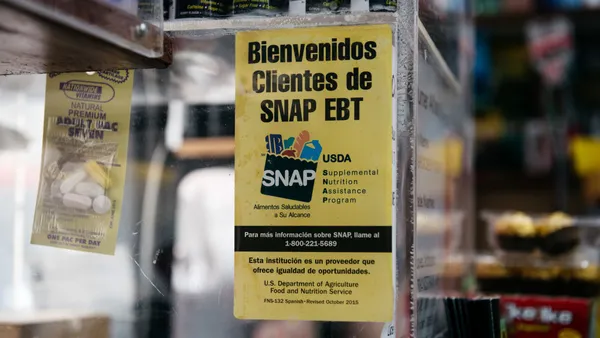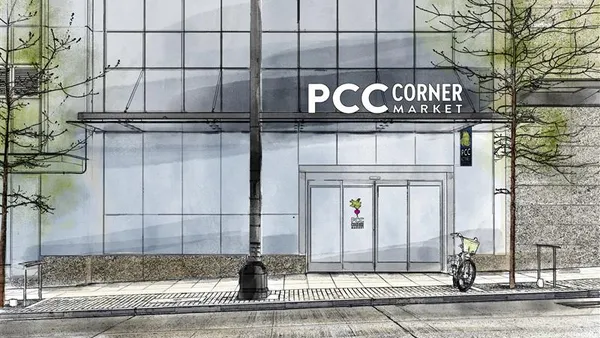Dive Brief:
- Grocers are cutting back their store hours in order to have additional time to clean locations and restock shelves amid the coronavirus-fueled shopping surge that’s sweeping the U.S., according to numerous reports and company statements.
- Walmart, The Giant Company, H-E-B and other retailers have done away with 24-hour service, while others are closing stores earlier and opening them later in the morning. On Saturday, Publix began closing stores at 8pm — two hours earlier than normal — while Harris Teeter on Sunday started closing stores at 9 p.m. Trader Joe’s said its stores will be open from 9 a.m. to 7 p.m. beginning Monday "to support our Crew Members in taking care of one another and our customers."
- Leading grocers have also pulled back on in-store sampling and foodservice. H-E-B has closed its in-store restaurants, including True Texas BBQ and South Flo Pizza, until further notice so employees can focus on stocking shelves. Wegmans has closed all of its in-store Pub restaurants, discontinues catering for the time being, and is offering limited selections at its self-service food bars. Meijer said in a tweet it has suspended its meat counter and deli salad service so employees can focus on building prepared meals.
Dive Insight:
While limiting store hours and cutting back services at a time like this may sound counterintuitive to consumers, retailers have tried to communicate that these steps will help them operate more safely and effectively. Many companies have posted messages from their chief executives on their websites and in stores and broadcast them over social media and email.
Grocers will use the extra time to clean their floors and shelves, sanitize carts and take other sanitary steps that should reassure shoppers. It’s not clear yet if limiting hours will help grocers improve their supply of canned goods, cleaning supplies and other categories that have been hit especially hard by stock-up shopping.
Consumer shopping habits may have to modulate first. To that end, officials are urging shoppers not to purchase products in mass quantities. Massachusetts Governor Charlie Baker told consumers that buying up large supplies of toilet paper and other products isn’t necessary.
“Get a few extra items when you go out — perfectly appropriate,” Baker said during a press conference Saturday. “But filling your basement with two years of canned soup just means your neighbor will have to go without.”
During a call Sunday with the chief executives of major grocers and food manufacturers, President Trump said it was unnecessary for shoppers to “hoard daily essentials,” according to a readout of the call.
Grocers are reluctant to criticize their shoppers’ buying habits, though they have put purchase limits on products like toilet paper and hand sanitizers in an effort to make those items available to more people. There are still plenty of empty shelves. On Saturday, more than a week after Kroger announced it would limit the sale of cold, flu and sanitary products to no more than three items per customer, a Fred Meyer store in Renton, Washington was completely out of toilet paper. The store was also out of cleaning wipes and most of its selection of pastas, canned soups and vegetables.
Grocers have also struggled to meet demand online. Peapod's site was operating intermittently last Thursday and Friday due to the surge in orders, while FreshDirect delivery slots were sold out for many customers. On Saturday Stop & Shop, whose e-commerce business is powered by Peapod, announced it would suspend its store pickup service until it can get a better handle on product supplies.
"As a result of unprecedented demand as well as product shortages in some areas, we have temporarily suspended our online pickup service until further notice," the grocer said in a statement posted to its website. "Our store associates will instead focus on stocking product and other key priorities that will better meet the needs of all customers at this time."
Manufacturers are boosting production in order to get key products back on shelves. Toilet paper manufacturers, for instance, are raising production rates, but don’t want to raise them too high for fear of having an oversupply once demand wanes, according to a New York Times report. Trade associations and retailers maintain that supply chains are fully functioning and that there’s plenty of food for consumers, even though many consumers don't believe that.
Meanwhile, retailers are issuing reassurances to shoppers over email and in stores. In a series of statements posted to company websites late last week, grocery executives sought to reassure customers they’re doing everything they can to keep stores clean and stocked while also working closely with government and health agencies. In a video announcement posted to Kroger’s Twitter feed Friday, CEO Rodney McMullen said the company has rolled out a special action plan to deal with the shopping surge.
Other retailers are offering special promotions to customers intended to take the sting out of shopping right now. Choice Market, which operates to Denver locations, is offering a $5 discount on any made-to-order meal deliveries over $20, in order to offset the fee.













